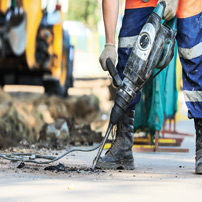Philadelphia Workers’ Compensation Lawyers: Machine Accidents
April 19, 2017Machine Accidents Caused by Improperly Guarded Equipment Create Additional Remedies for Injured Workers
 A machine that is guarded does not necessarily make it safe. The wrong type of guards on machines can and do leave machine operators prone to serious and sometimes fatal injuries. Workers’ Compensation benefits in Pennsylvania provide compensation for lost wages and medical bills while the injured worker recovers. In cases where the injury is caused, in part, by a machine or safety defect, injured victims may also be entitled to complete compensation through a third-party, product liability lawsuit.
A machine that is guarded does not necessarily make it safe. The wrong type of guards on machines can and do leave machine operators prone to serious and sometimes fatal injuries. Workers’ Compensation benefits in Pennsylvania provide compensation for lost wages and medical bills while the injured worker recovers. In cases where the injury is caused, in part, by a machine or safety defect, injured victims may also be entitled to complete compensation through a third-party, product liability lawsuit.
According to the United States Department of Labor (USDOL), approximately 700 workers die each year after coming into contact with industrial machinery. Over 5,000 workers are seriously injured and suffer amputation from machine accidents. In most cases, these types of catastrophic injuries are preventable when the right type of machine guards and safeguards are designed for the equipment. Amputations, crushed bones, head injuries, blindness, and severed fingers and toes can easily be prevented when machine guards keep workers from coming into contact with industrial machinery.
The Occupational Safety and Health Administration (OSHA) recommends that all moving parts of a machine should have safeguards in place. Areas where cutting, shaping, boring, or forming of stock are done are dangerous points of operation. Flywheels, pulleys, belts, connecting rods, couplings, spindles, chains, cranks, and gears are all parts that can draw a worker into the machinery and cause severe injuries and death. Reciprocating, rotating, and transverse moving parts that feed materials through the machine pose significant risks of contact for the worker.
Different Types of Machine Guards Used for Safeguarding Equipment
While a guard by definition is a physical barrier to prevent individuals’ hands or other body parts from entering into a hazardous area, not all guards are equal or effective. There are primarily three categories of guards, fixed, adjustable and interlocked. A fixed guard is one that is intended to be permanently attached to the machine with hardware that requires limited removal by maintenance personnel after a machine has been properly locked out and tagged out. Fixed barrier guards are used primarily for power transmission parts such as chains and sprockets and gears and pulleys.
An adjustable guard is one that can be positioned to accommodate a variety of operations, and when properly adjusted provides protection from the hazardous condition.
The most effective type of guard is an interlocked guard. This type of guard prevents the machine motion until the guard is into position so that the operator cannot reach into the hazardous area while the machine is either powered or in operation. The interlock can be mechanical, electrical, pneumatic or a combination of the above. Interlock guards are used particularly when a guard is hinged or capable of being readily removed. The advantage of an interlock guard is that it will prevent the machine from being powered or in operation if the guard is up or removed from the machine. An interlock guard will shut off the machine automatically in the event that an operator lifts up the guard and forgets to shut the machine off before reaching into a potentially hazardous area.
Also, the construction of a guard is important. Edges of guards should be smooth and free from sharp edges that can injure a worker who comes into contact with them. They also need to be designed to avoid interference with the routine maintenance or repair of the machine. A worker should not have to crawl into a dangerous area to access parts of the machine that need to be repaired or inspected.
Philadelphia Workers’ Compensation Lawyers at Galfand Berger LLP Help Victims of Industrial Accidents Claim Compensation
If you have been injured in an industrial accident, the experienced team of Philadelphia Workers’ Compensation lawyers at Galfand Berger LLP and senior partner Richard M. Jurewicz, Esquire can help you claim the maximum compensation available to you under the law. Call us at 800-222-USWA (8792), or contact us online to schedule a consultation today.
 Google Screened
Google Screened
